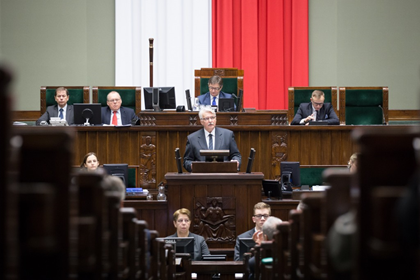MARTA MAKOWSKA
On Friday 29th of January, Minister of Foreign Affairs of Poland, Witold Waszczykowski, delivered the information on Foreign Policy in 2016 to the Polish Parliament.
In its main points, the long awaited speech came as a no surprise to those who follow the Law and Justice (PiS) rhetoric on international affairs. Fortunately, the language was careful and tailored to the audience, which included not only Members of the Parliament, but also foreign diplomatic corpus residing in Warsaw.
What can we expect in the coming year?
Waszczykowski devoted most of his speech to highlight the importance of security and sovereignty. Naming four rules on which the Polish foreign policy will be built, he underlined the following:
- foreign policy must be rooted in the will of sovereign states,
- primacy of international law over the idea of concert of powers,
- community of values of democratic world,
- economic exchange, also with non-European partners.
It is an open secret that Waszczykowski’s emphasis on international law and international order was assigned to Russia’s aggression towards Ukraine. But it was more than that, it was an oblique reference to the behaviour of particular EU member states that, in the opinion of Law and Justice, propound economic relations with Moscow over the binding rules of international law and solidarity with fellow European nations.
High expectations toward allied countries is another point to be taken away from Friday’s speech. Naming three major crises that Poland will face in the near future (security, neighbourhood and the European project), Minister stressed the biggest concern for Poland: Russia’s ambition to revise the post-Cold war order. He called for solidarity and equal status within the NATO, concluding that: “today it is NATO’s eastern flank that requires special attention”.
Importance of the alliance with the United States remains vital in two basic dimensions: security and economy, which means continuation of policies of the previous government, including positive stance on TTIP (Transatlantic Trade and Investment Partnership).
What about the EU?
Crisis of the European project is an important issue affecting well-being of the Polish citizens, according to Minister. Yet, careful examination of the speech leaves no illusions that PiS will contribute enthusiastically to the ‘European consensus’ on most dividing issue, the refugee crisis. Minister Waszczykowski made it rather clear, that, contrary to the previous government, PiS will not support a closer political union. The very fact that he mentioned the Great Britain as the most important European partner of Poland was a conscious choice based on the assumption that both Warsaw and London share the common vision of the integration. Nevertheless, many commentators are wondering how would the Polish government react, if the UK left the Union after referendum planned for July.
PiS will continue PO’s policy of supporting enhanced military capacities of the EU. Minister Waszczykowski referred to the defence and security cooperation among the EU and NATO as especially vital. While Common Security and Defence Policy is a project that get lots of interest in Warsaw, the plan of joint European Border and Coast Guard to protect external borders from uncontrolled influx of migrants, does not. It has been described by numerous PiS politicians as interfering with national sovereignty.
Germany, named ‘the most important neighbour of Poland’ has been mentioned no earlier than in the 52nd minute of the speech (the total length was approximately 1h 20 minutes). Law and Justice will most certainly change the current dynamics of Polish-German cooperation, yet they do declare the will to cooperate. What will be the most problematic, is the rhetoric of PiS – a language of expectations and resentment will not enhance achieving common grounds in issues such as policy toward Russia or Energy Union.
PiS declared the Poland wants a closer cooperation with several Central and Eastern European states, described as the most obvious partners. The concept of close union from the Baltic to the Black Sea has been introduced long time ago as a counterbalance to the Franco-German domination in the EU politics. The spectre of common vision and interests between countries such as Romania, Hungary, Slovakia and Poland remain unexamined.
Any revolution?
Minister Waszczykowski’s speech will not change the main directions of the foreign policy of Poland. Relations with Russia will remain difficult not because of the Polish position after the elections, but because of the broader problem of the Russian interests in our nearest neighbourhood. Also relations with the US, declared in the speech, are nothing revolutionary different from what we have seen under the rules of Civic Platform. The main fracture remains within the EU – it is our relations with the nearest neighbours (and the most important ones) that will shape our position not only on the continent, but also toward other major powers.
Read also:
J. Tołczyk, Trudne i ważne sąsiedztwo: relacje polsko-niemieckie w 2015 roku
M. Makowska, „Na deser, pod cokołem bez Lenina” – czyli Polska wobec Ukrainy
J. Żylicz, Czy jest szansa na bazy NATO w Polsce?
J. Tołczyk, Niemieckie reakcje na wyniki wyborów w Polsce
B. Marcinkowska, Polityka zagraniczna Françoisa Hollande – jakie priorytety na 2014 rok?

